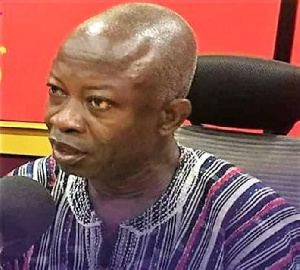- Home - News
- Polls
- Year In Review
- News Archive
- Crime & Punishment
- Politics
- Regional
- Editorial
- Health
- Ghanaians Abroad
- Tabloid
- Africa
- Religion
- Election 2020
- Coronavirus
- Photo Archives
- News Headlines
- Press Release
General News of Saturday, 30 May 2020
Source: GNA
Ghana would overcome monetization in politics - Dr. Amakye-Boateng
Dr. Kwasi Amakye-Boateng, a Senior Lecturer at the History and Political Science Department, Kwame Nkrumah University of Science and Technology (KNUST), has cited poverty as the main cause of monetization in Ghana’s politics.
“We have been facing this problem as a nation because of the level of poverty in our system,” he noted, and hoped the society would overcome this challenge in the course of the country’s political development.
Over the years, concerns had been raised by many political analysts and opinion leaders about the systematic payment of money to voters with the intention of “buying their votes”.
This trend, according to experts, was a setback to building a resilient democracy, where the people were at liberty to choose their own preferred leaders.
Dr. Amakye-Boateng, in an interview with the Ghana News Agency (GNA), Kumasi, said: “Gradually, we will get to the stage where voters could no longer be bought with money.”
He observed that there had been vast improvement regarding the manner in which money could influence voters, especially under the Fourth Republican Constitution.
He said voters are becoming more conscious of their rights and responsibilities, casting their ballots based on developmental issues.
Dr. Amakye-Boateng stressed the need for the country to stay focused and work seriously to improve the economy, thereby creating jobs and wealth for the people.
“When this is done it would reduce the tendency of the Ghanaian voter being influenced with money in order to sway his or her decision during elections,” he observed.
The Senior Lecturer, sharing his views on proposals by a section of the public to postpone this year’s General Election in the wake of the COVID-19 (coronavirus) pandemic, said that decision would be “terribly imprudent”.
“It would affect Ghana’s democratic dispensation,” he insisted, explaining that under the Fourth Republican Constitution, the tenure of elected leaders had been duly stipulated and which ought to be adhered to.
Dr. Amakye-Boateng said postponing the Presidential and Parliamentary Elections scheduled for December, this year, could hamper political stability.
He said “The COVID-19 pandemic had come to stay with us,” he argued, therefore, it was necessary that the preventive protocols were put in place for the safety of the people, while also not disrupting the electoral processes.
Entertainment










